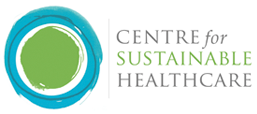- Group home
- You must register/login in order to post into this group.
Sustainability in Quality Improvement Projects
By: King's College London Medical School
Summary
Kings College London (KCL) has taken a novel approach to including sustainability in their curriculum, and has developed Quality Improvement Projects (QIPs) for 4th year medical students. This approach has been steadily growing since 2015 with each year seeing more students engaging in sustainability-focussed QIPs, and all students (even those whose focus is not on a sustainability QIP) now evaluate the sustainability aspects and implications of their QIP. The majority of sustainability QIPs are in General Practice (GP), but students carrying out QIPs in hospitals can also choose a sustainability focus.
Course Description
In 2015/16, six selected GP practices and 18 allocated students were involved in the KCL pilot project. Students undertook a modified Health Promotion review, which involved collecting baseline quantitative data to inform a Plan-Do-Study-Act (PDSA) cycle as part of a QIP.
GPs were offered written information and one face-to-face briefing session about sustainability and quality improvement in 2015/16. The GP practices specified the focus of the QIPs. In 2018/19 the pre-project clinical educator training is being adapted to make it more accessible to GPs, and will comprise e-learning and a webinar.
The pilot project benefitted students and GP practices alike. Students gained research experience and learnt more about sustainability in the workplace. Clinical educators also learnt about sustainability, and many cited improvements in sustainability in their workplace. The project was therefore expanded in 2016/17 and 2017/18 so that all fourth year students (not only those allocated to certain GP practices) now have to report on the sustainability aspects of a QIP carried out in a group of five in either a hospital or a GP setting.
Examples of projects completed by students are facilitation of a move from paper to electronic prescribing in a GP practice, and establishment of diabetic support groups which has stimulated members to change their dietary habits and physical activity. The electronic prescribing had been available to GPs, but not achieved sufficient uptake until the student project evaluated and acted to support uptake. The diabetic support groups instigated by the students remain active, welcoming new members, and were re-audited by the 2017-18 student cohort.
Course or session dates: 11/12/2015 until 29/04/2016, and in subsequent years
Number of students taught: 18 in 2015-16, expanding to 430 in 2017/18
Pedagogical format: Project Based
Teaching time: 8 hours. Self-directed learning: 6-12 hours
Teaching time for sustainable healthcare (hours): 2-3 hours
Curriculum area: General Practice
Sustainability learning outcomes addressed:
PLO 2 - Demonstrate the knowledge and skills needed to improve the environmental sustainability of health systems
PLO 3 - Discuss how the duty of a doctor to protect and promote health is shaped by the dependence of human health on the local and global environment
Lessons learnt
- Educators at KCL reflected that this type of project needs significant pre-project briefing to ensure that both students and staff understand sustainability concepts and are prepared to design and run a QIP. The attendance of GPs at a face-to-face briefing was low, hence the decision to move to e-learning and a webinar. Educators also emphasised that it is important that all the GPs in the practices are on board to support the project’s success.
- Overall, students valued and embraced the project. Since the project is time intensive, informing students early on about their allocation and giving them time to get to grips with the pre-reading and e-learning early is very beneficial.
A GP said:
“Enthusiastically engaged with whole practice team to implement the change to electronic prescribing with a realistic target and using a variety of ideas to educate and encourage change in both staff and patients without causing significant extra work for staff and educating patients positively to encourage compliance with good effect.”
Students said (focus group):
“I’d never really thought about this kind of thing before, so it was good to see how these projects work from a smaller scale just so that it was something that we could do in a short space of time, but as [I] said, just quite useful to understand ‘cos it would be quite useful in our future practice if we wanted to improve certain aspects of it.”
“…overall I thought it… the practice was great in terms of letting us do what we needed to do, the project itself I think is a good idea, just with the issues we had and I think the timeframe it could be improved, with how it’s implemented.”
“…maybe sometimes it’s hard to link sustainability with the quality improvement project you’re trying to do, like ‘cos for us sustainability wasn’t a focus in terms of trying to implement, or design our project, and I mean it could have been a bit more I guess, but they’re two different things to think about at the same time I guess.”
“I think for me it highlighted that this is kind of going to be the new, not craze, but the new focus for the NHS to be more environmentally friendly and green.”
London, UK
